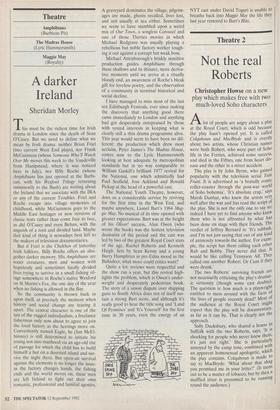Theatre
Amphibians (Barbican Pit)
The Madras House (Lyric Hammersmith) Maggie May (Royalty)
A darker Ireland
Sheridan Morley
This must be the richest time for Irish drama in London since the death of Sean O'Casey. But we need to define what we mean by Irish drama: neither Brian Friel (two current West End plays), nor Frank McGuinness (whose Someone Who'll Watch Over Me moves this week to the Vaudeville from Hampstead, where it was noticed here in July), nor Billy Roche (whose Amphibians has just opened at the Barbi- can, with his Wexford Trilogy returning imminently to the Bush) are writing about the Ireland that we associate with the IRA or any of the current Troubles. Friel and Roche escape into village memories of childhood, while McGuinness goes to the Middle East hostages or new versions of classic texts rather than come face to face, as did O'Casey and even Behan, with the anguish of a torn and divided land. Maybe that kind of thing is nowadays best left to the makers of television documentaries.
But if Friel is the Chekhov of latterday Irish folklore, Billy Roche offers an alto- gether darker Memory. His Amphibians are water creatures, men and women with hopelessly and sometimes fatally divided lives trying to survive in a small fishing vil- lage somewhere in Roche's native Wexford on St Martin's Eve, the one day of the year when no fishing is allowed in the Bay.
So the community is thrown back in upon itself, at precisely the moment when history and social change are tearing it apart. The central charaeter is one of the last of the rugged individualists, a freelance fisherman only now about to agree to join the local factory as the herrings move on. Conveniently named Eagle, he (Ian McEl- hinney) is still determined to initiate his young son into manhood via an age-old rite of passage for which the child has to build himself a hut on a deserted island and sur- vive the night there. But open-air survival against the elements is no longer the issue: as the factory changes hands, the fishing ends and the world moves on, these men are left behind to fight out their own romantic, professional and familial agonies. A graveyard dominates the village, pilgrim- ages are made, ghosts recalled, lives lost, and not usually at sea either. Sometimes we seem to have stumbled upon a 'weird mix of Our Town, a songless Carousel and one of those Thirties movies in which Michael Redgrave was usually playing a rebellious but noble factory worker tough- ing It out against a corrupt but weak boss.
Michael Attenborough's briskly sensitive production guides Amphibians through these shallows and its thinner, more deriva- tive moments until we arrive at a ritually bloody end, an awareness of Roche's bleak gift for loveless poetry, and the observation of a community in terminal historical and social decline.
I have managed to miss most of the last ten Edinburgh Festivals, ever since making the discovery that anything good there came immediately to London and anything bad got desperately overpraised by those with vested interests in keeping what is clearly still a thin drama programme alive. This year would seem to have been no dif- ferent: the production which drew most acclaim, Peter James's The Madras House, comes now to the Lyric Hammersmith looking at best adequate by metropolitan standards but in no way comparable to William Gaskill's brilliant 1977 revival for the National, one which admittedly had Paul Scofield, Joss Ackland and Ronald Pickup at the head of a powerful cast.
The National Youth Theatre, however, does us a considerable service by reviving for the first time in the West End, and maybe anywhere, Lionel Bart's 1964 Mag- gie May. No musical of its time opened with greater expectations: Bart was at the height of his Oliver! success, Alun Owen (who wrote the book) was the hottest television dramatist of the period and the cast was led by two of the greatest Royal Court stars of the age, Rachel Roberts and Kenneth Haigh. Sets by Sean Kenny and a young Barry Humphries in pre-Edna mood as the Balladeer, what more could critics want?
Quite a lot: reviews were respectful and the show ran a year, but this revival high- lights the problem, which is Owen's under- weight and desperately pedestrian book. The story of a union dispute over shipping guns to South Africa does not of itself sus- tain a strong Bart score, and although it's really good to hear the title song and 'Land Of Promises' and 'It's Yourself' for the first time in 30 years, even the energy of an NYT cast under David Toguri is unable to breathe back into Maggie May the life they last year restored to Bart's Blitz. •


































































 Previous page
Previous page